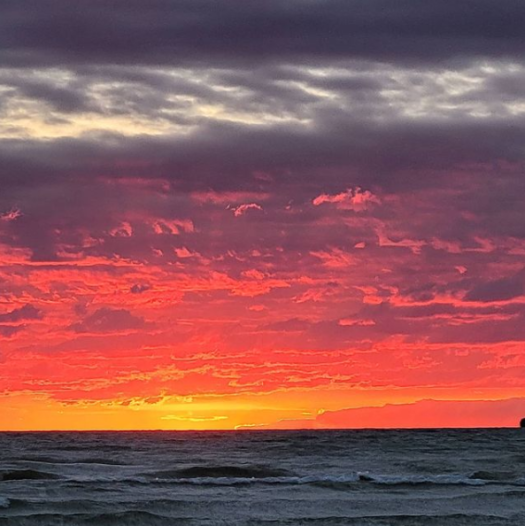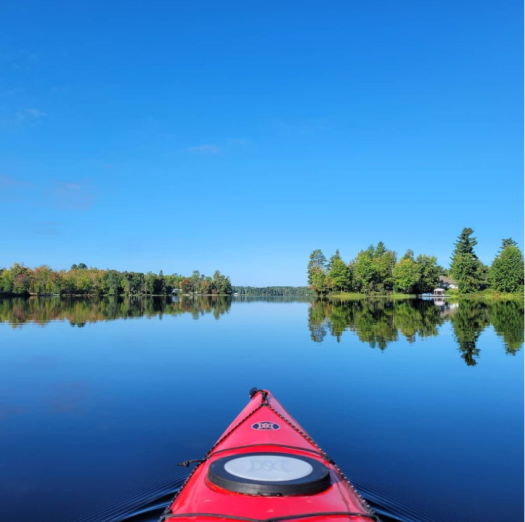
Wearing my shirt for the first Truth and Reconciliation Day


Links that interest me and maybe you

Note: This was originally published as the daily newsletter for the Columbia Journalism Review, where I am the chief digital writer
Earlier this month, an Australian court issued a decision in a long-running defamation case: the judges ruled that Dylan Voller, who filed the case in 2017, could proceed with a defamation lawsuit against a number of Australian media outlets, including Murdoch-owned The Australian and Sky News. Not that unusual. Except that Voller isn’t suing these news companies for things they printed or broadcast about him, he’s suing them for things that Facebook users said in comments that appeared on the Facebook pages of those media companies after they linked to news stories about him. In effect, the Australian court said these media outlets are legally responsible for the comments their readers left on those posts, even if the companies were unaware of their existence. The chilling effect of this decision has already been felt even outside Australia: according to a report in the Wall Street Journal on Tuesday, CNN says it will shut off all public access to its Facebook pages in Australia because of the ruling.
The decision states that “the acts of the appellants in facilitating, encouraging and thereby assisting the posting of comments by the third-party Facebook users rendered them publishers of those comments,” and therefore liable. The judges added that an attempt by the media companies to portray themselves as “passive and unwitting victims of Facebook’s functionality” was not credible. “Having taken action to secure the commercial benefit of the Facebook functionality, the appellants bear the legal consequences,” the court said. It’s worth noting that the decision isn’t a lower-court ruling that might later be reversed: Voller won the original case, giving him the right to sue the companies; an appeals court upheld that decision in 2019, and that in turn was appealed to the country’s highest court, which issued the latest ruling. Five of the seven judges hearing it agreed with the majority.
When news of the decision was first released, some speculated that media companies might shut down their comments, or even their entire Facebook presence, for fear of being caught up in similar lawsuits. CNN appears to be the first, but it may not be the last. The media company reportedly asked Facebook for help in turning off comments on all of its posts in Australia, but the social network refused. Until recently, Facebook didn’t allow comments to be turned off on pages, presumably because they are a significant source of user engagement. It introduced the ability to do so in 2019, after the original Australian court decision in the Voller case, but comments have to be disabled on a post by post basis, rather than across all of a publisher’s pages.
Continue reading “Australian defamation ruling threatens media companies”

Note: This was originally published as the daily newsletter for the Columbia Journalism Review, where I am the chief digital writer
In a data leak first reported last week by independent journalist Steven Monacelli on Twitter, a group of unnamed hackers claiming to be associated with the hacker collective known as Anonymous released more than 180 gigabytes of data from Epik, a web-hosting company that has become notorious for having a number of alt-right groups and services as clients, including right-wing Twitter alternatives Gab and Parler, as well as pro-gun and pro-Trump sites. “This dataset is all that’s needed to trace actual ownership and management of the fascist side of the internet,” the group said in its news release. “Time to find out who in your family secretly ran an Ivermectin horse porn fetish site, disinfo publishing outfit or yet another QAnon hellhole.” The data dump is said to contain account information for all of Epik’s clients, including the registered owner’s email address, mailing address, and other information (although some right-wing sites use anonymization services to conceal this data).
The importance of the information in the Epik hack — if it proves to be accurate — seems obvious, especially for researchers trying to track QAnon groups or other disinformation sources, as well as hate-speech advocates and domestic terrorists. “The company played such a major role in keeping far-right terrorist cesspools alive,” Rita Katz, executive director of SITE Intelligence Group, which studies online extremism, told the Washington Post. “Without Epik, many extremist communities—from QAnon and white nationalists to accelerationist neo-Nazis—would have had far less oxygen to spread harm, whether that be building toward the January 6 Capitol riots or sowing the misinformation and conspiracy theories chipping away at democracy.”
Emma Best, co-founder of Distributed Denial of Secrets, a journalism non-profit that specializes in leaked data, told the Post that some researchers have called the Epik hack “the Panama Papers of hate groups,” a comparison to the leak of more than 11 million documents that exposed the offshore finance industry. Megan Squire, a professor at Elon University who studies right-wing extremism, told the Post “It’s massive. It may be the biggest domain-style leak I’ve seen and, as an extremism researcher, it’s certainly the most interesting. It’s an embarrassment of riches.” Like the Panama Papers, getting information out of the huge database and making sense of it is time-consuming, which could explain why it took several days for mainstream sites like CNN and the Post to report on the Epik hack.
Continue reading “Leaked files from alt-right host Epik raise some hard questions”
Note: This was originally published as the daily newsletter for the Columbia Journalism Review, where I am the chief digital writer
In the aftermath of the 2016 presidential election, and widespread criticism that Facebook had helped to destabilize the process by enabling Russian trolls and spreading disinformation, the company seemed to strike mostly an apologetic tone. Mark Zuckerberg, Facebook’s co-founder and chief executive, occasionally seemed defensive in his subsequent testimony before Congress, but the general sense was that he and the company were sorry for playing a role in those events, and were trying to do better. However, more recently Facebook appears to be taking a much more aggressive approach to criticism, if the company’s response to recent reporting from the Wall Street Journal and New York Times is any indication. The social network also seems to be trying to shift public opinion by inserting positive stories about Facebook into users’ news feeds, while Zuckerberg is doing his best to stay out of the fray.
After a series of Journal articles detailing how Facebook has a special program that allows celebrities to get around the platform’s rules of behavior, and has ignored the advice of its own researchers in its drive for growth at both Facebook and Instagram, the company responded with a lengthy blog post written by Nicholas Clegg, vice-president of global affairs and a former deputy prime minister in the UK. In it, the Facebook executive said the stories “contained deliberate mischaracterizations of what we are trying to do,” and that the reporting from the Journal “conferred egregiously false motives to Facebook’s leadership and employees.” The central allegation in the series, he said — that the company conducts research, and then systematically and willfully ignores it if the findings are inconvenient — is “just plain false.”
In the past, given such accusations, Zuckerberg might have penned his own blog post explaining the company’s behavior, as he did when Facebook said it was moving discussions on the platform toward private groups and encrypted messaging, or when he was describing his commitment to free speech, or when he discussed the decision to permanently block Donald Trump from the platform. In this case, Facebook decided to expand on Clegg’s argument in a separate post, but the post was not signed by anyone. In it, the company tried to highlight some of the positive work it has done on disinformation and abuse, including the fact that it has 40,000 people working on safety and security, and has invested more than $13 billion to protect users (which a former Facebook executive pointed out is about four percent of the company’s revenue).
Continue reading “Facebook goes on the offensive against critical reporting”Whenever we travel somewhere within driving distance, I like to bring the kayaks, in case there’s a lake or a river or something where I can paddle around and see the scenery from a different perspective. So when we went to visit my daughter and son-in-law in Ancaster (near Hamilton, west of Toronto) I brought the kayaks and looked around for a place to paddle. Driving past Hamilton on the highway, you can see a large body of water to the north, and I had always wondered what it was, and whether I could paddle there. So I looked it up and it turns out it’s a wetland area called Cootes’ Paradise, which was created in 1927 and includes a marsh that’s about 320 hectares in size.

So one morning, when it looked like it was going to be warm and sunny, I drove down to a park right next to the wetland and dropped the kayak into the water and headed out. Right away I saw a bunch of white egrets sitting on a berm, and as I turned the corner into the larger part of the lake, I could see it was about half a kilometre across or so, with a couple of narrow channels I could paddle down, so I headed out to explore one. Someone seemed to have sent a memo to all the turtles telling them to lie out in the sun, because literally every downed tree was covered in turtles of various sizes.
Continue reading “A kayak trip through Cootes’ Paradise”


Note: This was originally published as the daily newsletter for the Columbia Journalism Review, where I am the chief digital writer
In 2018, Mark Zuckerberg, co-founder and chief executive of Facebook, said that the company was rolling out a significant change to the algorithm that governs its News Feed, in an attempt to encourage more users to interact with content posted by their friends and family, rather than content from professional sources such as news publishers and other brands. One of the reasons for doing this, Zuckerberg said, was a growing body of research showing that consuming mostly content from brands and publishers was not good for the well-being of users. However, according to a report from the Wall Street Journal published on Wednesday, the algorithm change didn’t improve the well-being of users — in fact, it actually had the opposite effect. Internal memos describe how the company’s own researchers said the changes were making the News Feed “an angrier place” by encouraging outrage and sensationalism. And when they suggested changes, Zuckerberg turned them down because they would decrease engagement, the Journal says.
The Facebook researchers “discovered that publishers and political parties were reorienting their posts toward outrage and sensationalism,” the Journal report says, because this generated higher levels of comments and reactions, which the platform uses as indications that a post is successful and should be amplified. “Our approach has had unhealthy side effects on important slices of public content, such as politics and news,” data scientists at the company said in memos that the newspaper was able to read. “This is an increasing liability. Misinformation, toxicity, and violent content are inordinately prevalent among reshares.” These researchers worked on a number of potential changes that they hoped might ameliorate the algorithm’s tendency to reward outrage, the Journal says, but memos show Zuckerberg resisted many of these solutions because he was worried they might lead to people spending less time interacting with content on the platform.
The emails and memos the newspaper quotes from are part of what it calls “an extensive array of internal company communications” that it gained access to (although it’s not clear how), which so far have produced three investigative pieces on the company’s practices, of which the News Feed story is the third. The first, from reporter Jeff Horowitz, described a little-known system within the company that allowed VIPs to avoid any repercussions for breaching the platform’s terms of service. The program, known as XCheck (pronounced cross check) allowed celebrities, politicians, athletes, and other “influencers” to post whatever they wanted, with no consequences. Although an internal Facebook report seen by the Journal referred to “a select few members” as having this ability, the story says that as of last year, close to 6 million people were covered by the XCheck program.
Continue reading “Internal memos show Facebook knew about flaws and did nothing”
As we have done the past several years, we did a big backcountry camping trip in September, right around my birthday, with our neighbours and friends Marc and Kris. This year it was a little harder to find a campsite than it has been in previous years, because COVID restrictions loosened up and everyone wanted to be out in the woods apparently. But we found a great site on a little lake called McEwen, just northwest of Carnarvon, and we picked a great weekend to do it because the weather was fantastic for camping — a big rainstorm went by just as we were getting ready to put in, but we didn’t even get wet, and it was essentially warm and sunny the whole time we were there. It did get a little cool at night — like around 9 degrees Celsius — but we were fine.

We put into Margaret Lake, which is long and thin, but we crossed it sideways and then had a fairly long and rocky portage (about 300 metres or so) uphill to the next put-in. Unfortunately, it had rained not that long before we got there, so the trail was quite muddy, but we made it without any mishaps. We paddled out of a swamp and into Dan Lake, and stopped partway up for a lunch break at one of the campsites. We were thinking we would have another portage to get into McEwen, but as it turned out the water was still high enough that we just poled the canoes through a narrow swampy section and we were in McEwen. After that, it was only a 20-minute or so paddle and we made it to our campsite.

